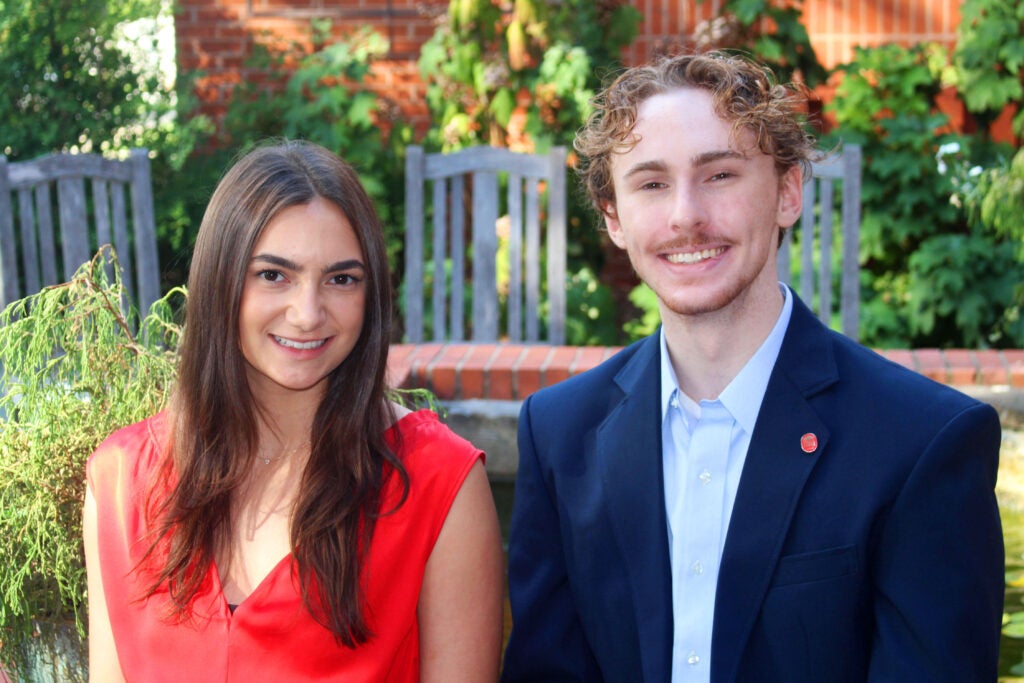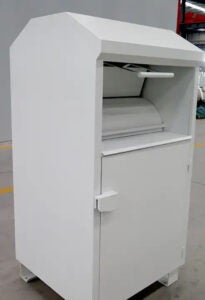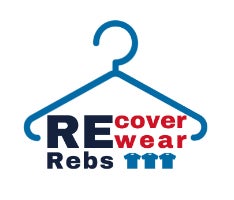Ole Miss Student project aims to stem clothing waste
Published 11:31 am Thursday, January 18, 2024

- Ole Miss students Mia McKey (left) and Ross Cohen are project owners for an Ignite Ole Miss crowdfunding campaign securing funds to purchase steel clothing donation bins for residence halls on the Oxford campus. Re-Rebs is a campuswide initiative focused on keeping clothes out of landfills and getting them into the hands of local organizations. (Brady Bramlett/University Development)
Classroom project grows to make real-world impact with Re-Rebs
By Reagan Collins
What began as a University of Mississippi class project has evolved into a campuswide initiative to keep discarded clothing out of landfills and into the hands of people who need it.
Through an Ignite Ole Miss crowdfunding campaign, UM senior Mia McKey is seeking financial support for her project, Re-Rebs. The campus-enrichment project was spawned in McKey’s Sally McDonnell Barksdale Honors College public policy leadership course.
Re-Rebs, which places clothing-donation bins in residence halls, is already making a positive impact on Ole Miss and the surrounding community.
“We hope the implementation of permanent bins will help divert the average 82 pounds of clothing waste the average American consumer throws away every year into the hands of those in need,” said McKey, of Oxford.
Re-Rebs began with cardboard boxes placed around campus, but McKey hopes to raise $3,500 to install new steel anti-theft bins in Martin, Stockard, Crosby and Pittman residence halls and in the Luckyday Residential College. Each bin costs $480.

The Re-Rebs project is working to raise $3,500 to install steel clothing recycling bins in residence halls on the Ole Miss campus. (Submitted)
The Ignite Ole Miss campaign has reached 66 percent of this goal, with $2,312 in gifts. Ultimately, the goal is to install donation bins in all 15 residence halls across campus.
The idea for Re-Rebs began when McKey noticed large amounts of clothes being discarded by students in her sorority.
“I wanted to work with sorority houses to redirect this clothing not only from the landfill, but away from national donation companies to local organizations to better support the Oxford-Lafayette-University community,” she said.
To determine whether such an initiative was needed, McKey conducted a campuswide poll that revealed 50 percent of students or their friends threw away used clothes rather than donating them. Additionally, 96 percent of students responded they would be more likely to donate clothes if designated bins were accessible on campus.
Motivated by the compelling statistics, McKey said she was convinced the project would succeed. She placed boxes in residence halls and sorority houses, and students used them. McKey then collected the donated clothes and gave them to local organizations that would reuse them.
McKey appreciates the support she received throughout the process.
“First off, every student in the PPL course played an integral role in making this project a reality,” she said. “Ross Cohen has continued working on this project with me following the conclusion of the class. Joseph Holland, the professor of our course, has been a mentor and encourager throughout the process.
“Furthermore, the Sally McDonnell Barksdale Honors College, Center for Community Engagement, Career Center and the Office of Sustainability have all offered their support and encouragement.”
Brady Bramlett, director of development for the Honors College, said he found this project to be particularly meaningful.
“It’s evident how our Honors College prepares our students to be changemakers and to think critically about our world,” he said. “Re-Rebs is the perfect example of an idea taking spark and becoming an initiative much bigger than a class project.”
Part of the initiative is to spread awareness of the environmental and ethical concerns of the fast-fashion industry. This industry churns out trendy clothing, often mass-produced and sold at low prices. Unfortunately, this has led to a culture of purchasing and rapidly discarding clothing, resulting in overflowing landfills packed with wearable items.
Research indicates that young adults are most likely to buy, wear and throw away fast-fashion clothing, so the problem is especially acute on college campuses.
“We hope Re-Rebs starts conversations and prompts consideration about where your clothes come from, where they go and what you can do to change the trajectory of the fashion industry,” said McKey, who plans to pursue a master’s degree in environmental management and development after completing her undergraduate degree in May.
To support Re-Rebs, visit Ignite Ole Miss.






